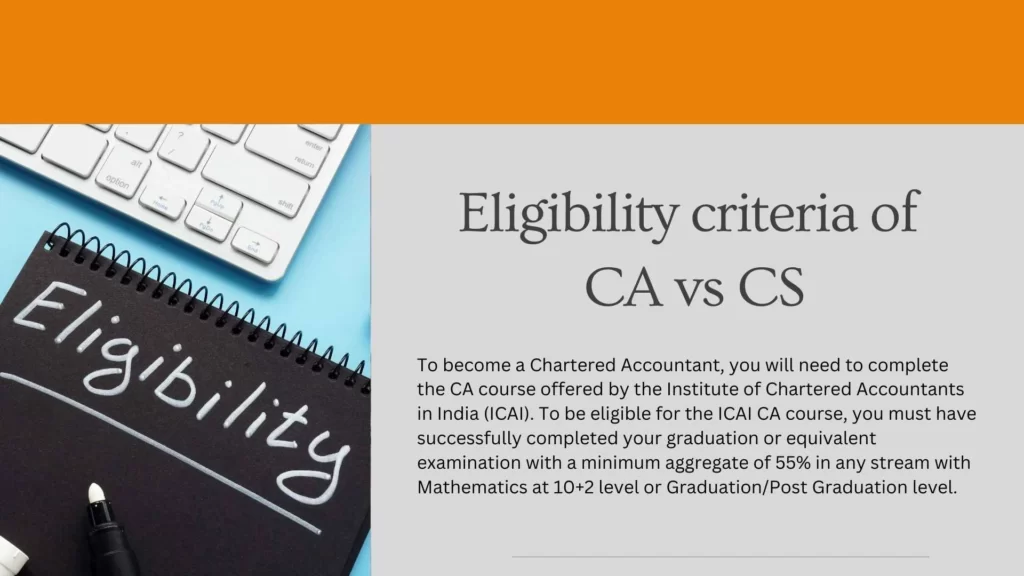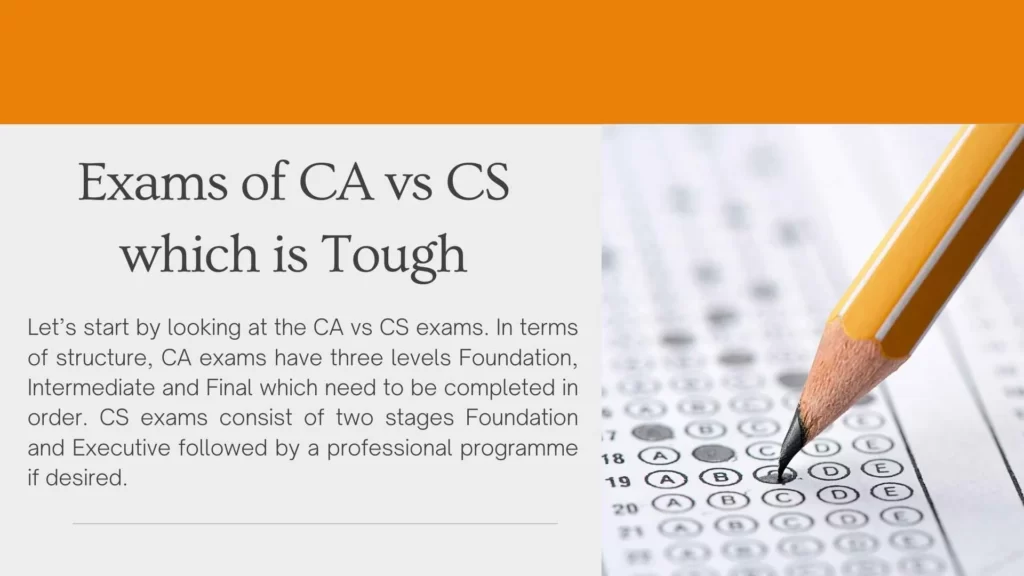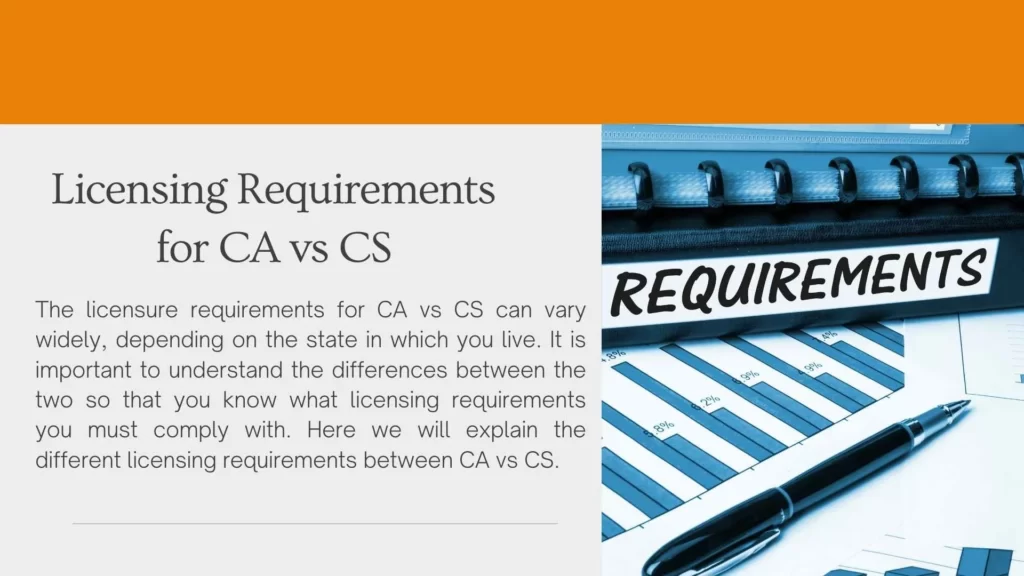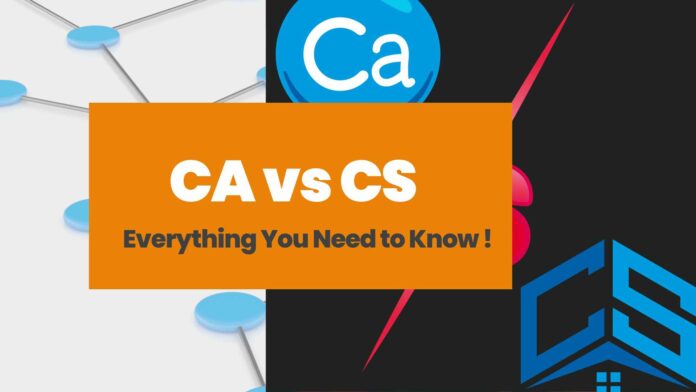Introduction
When starting a business, it’s important to understand the distinction between them as they can have a major impact on your company. In this blog post, we’ll discuss the introduction to CA vs CS and empower you to make sound decisions for your business.
CA stands for Company Act, and it’s a law that applies to any type of company in India. The Companies Act is responsible for governing how companies are created, managed, and administered in India. This act defines the rights and duties of shareholders, directors, auditors, creditors and other interested parties in dealing with companies. As per The Companies Act 2013 (the latest version of the act), all companies in India must follow the rules set out by The Companies Act in order to remain legal and compliant.
CS is short for Companies Secretarial. It deals with document filing under The Companies Act 2013 on behalf of a company or its director. In a nutshell, Company Secretarial services involve the filing of documents such as annual returns, changes in directorships/shareholdings etc with MCA (Ministry of Corporate Affairs) as well as other governmental agencies like registrar of Companies etc.
Within specified time frames. This can include anything from drafting documents and conducting audit procedures to providing corporate advice on compliance matters so that businesses remain compliant under the Companies Act 2013.
Both CA vs CS is incredibly important components when founding or running any type of business in India. A professional who holds expertise in both is invaluable to any growing business today and can help guide you through understanding both aspects with ease during crucial moments for your company’s growth trajectory.
Eligibility criteria of CA vs CS

Talking about CA vs CS. The two qualifications have their own sets of eligibility criteria that you should be aware of before deciding which qualification is right for you. In this blog, we’ll explore the education and experience requirements for CA vs CS qualifications, as well as the differences between training and membership for both.
To become a Chartered Accountant, you will need to complete the CA course offered by the Institute of Chartered Accountants in India (ICAI). To be eligible for the ICAI CA course, you must have successfully completed your graduation or equivalent examination with a minimum aggregate of 55% in any stream with Mathematics at 10+2 level or Graduation/Post Graduation level. You must then register yourself as a student member with ICAI and pass three levels of examinations: Foundation, Intermediate, and Final.
The eligibility criteria for becoming a Company Secretary are slightly different from that of a Chartered Accountant. To qualify as a CS you must have completed an academic program from the Institute of Company Secretaries (ICSI). This includes passing all the Foundation Program exams, Executive Program exams, and Professional Program exams conducted by ICSI. Additionally, candidates are required to serve a three-month apprenticeship under an existing Company Secretary before applying for membership with ICSI.
It is important to note that qualifying examinations alone do not make someone either a CA or CS. For both fields, additional training is also required after passing the examinations in order to become members of their respective institutes ICAI or ICSI respectively.
Visit the best investment banker course
Exams of CA vs CS which is Tough

When it comes to professional qualifications, one of the most popular debate topics is whether the CA vs CS, whether CA vs CS exam is tougher. While there is no definitive answer, it’s possible to compare the two exams and assess the difficulty level and impact on respective career paths.
To begin with, let’s start by looking at the CA vs CS exams. In terms of structure, CA exams have three levels Foundation, Intermediate and Final which need to be completed in order. CS exams consist of two stages Foundation and Executive followed by a professional programme if desired. The CA course is considered more lengthy and complex due to the number of levels while CS can be completed relatively quickly depending on how intensively one studies and prepares for each stage.
In terms of difficulty level, both courses require considerable effort and dedication due to their scope and complexity. However, some people feel that CA exams are slightly harder as they cover a broader range of topics compared to CS. Additionally, CA students need to gain in-depth knowledge across all areas including taxation, accounting and auditing as opposed to CS who only need an understanding of one subject area of corporate laws.
Training/preparation is also important when comparing both courses as it can greatly improve success rates in each exam cycle. For both CA vs CS, there are many online resources available such as mock test papers or study materials that can help candidates prepare for the exams effectively. Furthermore, intensive coaching centre classes can also be beneficial for those looking for additional support during their studies.
Syllabus

If you’re considering a career in accountancy or company secretarial, you may be wondering what the syllabus of CA vs CS is. That’s why it’s important to understand the differences between these two paths so that you can make an informed decision about which path is right for you.
There are many similarities between the Syllabus of CA vs CS programs. Both qualifications involve passing a set of exams, and both areas of study are heavily based on financial concepts such as accounting and auditing. However, there are also some differences between the two qualifications.
The syllabus of CA vs CS qualification differs in a few key ways. For example, while CA requires aspirants to pass an exam on taxation law and auditing principles, CS aspirants must pass a separate examination on company law and corporate governance. Both courses focus on different topics; for instance, CA focuses more heavily on financial concepts like accounting principles and balance sheet analysis, whereas CS focuses more on legal aspects such as company law and corporate compliance.
In terms of assessment formats, a lot depends on which institution provides the syllabus for each qualification. Generally speaking, a typical CA program may include written papers as well as short answer questions and project-based assignments; whereas CS usually involves taking tests that focus on multiple choice questions and other practical tasks related to company secretarial duties such as filing documents with the relevant authorities.
It is also worth noting that both qualifications are available in various forms – full-time study programmes or distance learning courses – depending upon the institution offering them.
Fees Structure for CA vs CS
The fees of CA vs CS are a common question for students looking to enter higher professional studies. Both CA vs CS degrees offer different opportunities and scopes, making it important to understand the differences between the two.
CA vs CS fees varies based on the course structure and requirements, as well as the institute that you choose. Generally, the CA course is more expensive than the CS course due to its longer duration and complexity. The CA course has 3 stages: Foundation Course, Intermediate Course, and Final Course.
Each of these stages takes 18 months or more to complete and the total fee for all three stages can amount to Rs. 6 lakhs approximately. Alternatively, the CS course has only two levels: a Foundation Course and an Executive Program with a total duration of 15 months at an approximate fee of Rs. 1 lakh.
Choosing between a CA vs CS degree depends on your career goals and objectives. A Chartered Accountant will have a robust knowledge of taxation, accounting principles, auditing standards, and corporate law & regulations; making them ideal for financial roles in companies. On the other hand, a Company Secretary has extensive knowledge of corporate laws & compliance management which helps them gain employment opportunities in senior-level corporate roles like Compliance Manager & Corporate Governance Advisor among others.
The benefits of being either a CA or a CS are immense with numerous career prospects after each degree program – such as auditor positions within government agencies/private firms or company secretary positions in large organizations amongst many others. Additionally, both degrees provide excellent opportunities for self-employment by setting up your own practice or consultancy after gaining significant years of experience in relevant specializations within the finance sector industries.
Suggested Page:-
- PG Program In Investment Banking with placement guarantee
- PG Program In Financial Modelling with placement guarantee
Licensing Requirements for CA vs CS

The licensure requirements for CA vs CS can vary widely, depending on the state in which you live. It is important to understand the differences between the two so that you know what licensing requirements you must comply with. Here we will explain the different licensing requirements between CA vs CS.
First, let’s look at CPA licensing requirements. In order to become a CPA in most states, one must first pass the Uniform CPA Exam. This exam consists of 4 sections and covers topics such as auditing, taxes, accounting information systems, financial reporting, and business law. After passing the exam, a candidate also typically has to meet other requirements such as completing continuing professional education programs and undergoing background checks. Once these have been completed, the candidate is eligible for licensure.
Next, let’s focus on CS certifications. While similar in some ways to CPAs, they require different qualifications and certifications in order to attain a license. Unlike CPAs who must pass the Uniform CPA Exam, CSs must complete an accredited computer science or IT program before taking their certification exams—which include a Core Exam as well as additional speciality-focused certification exams depending on their chosen area of study.
After passing their exams and meeting other regulatory requirements such as background checks and professional references—they can then apply for their license from their state board of accountancy or related agency.
To sum up both CA vs CS credentials: CPAs need to pass the Uniform CPA Exam while CSs need an accredited IT/computer science degree and pass related certification exams before they can be licensed by their state board or related agency.
Job Opportunities
Are you in the process of deciding which to pursue a career as a CA vs CS? With either path, there are plenty of job opportunities available. However, it’s important to consider the differences between CA vs CS roles before picking a specialization.
A Chartered Accountant is responsible for providing financial advice, auditing accounts, and maintaining company records. This role could involve preparing financial statements for companies or individuals, reviewing government regulations, and overseeing tax payment systems. Additionally, CAs may be able to offer management consultancy services.
On the other hand, Company Secretaries are responsible for ensuring that a company complies with legal and regulatory requirements. Their duties can vary but usually cover general corporate governance tasks such as setting up meetings, keeping company registers up to date, and managing share capital and dividends distribution among shareholders. They may also be required to provide guidance on legal matters such as contract negotiation and dispute resolution.
Both roles require excellent communication skills and knowledge of business law and finance principles. Depending on your areas of expertise, each career has its own unique advantages. CAs are more likely to find work in public accounting firms while CSs often work in-house for large corporations or government agencies.
At the end of the day, both CA vs CS qualifications offer promising job prospects that can lead to lucrative careers in accounting or corporate governance roles. It’s important to research both areas thoroughly before making an informed decision about which one is right for you!
Career Prospects of CA vs CS

When considering a career path involving accounting and finance, prospective professionals may come across various options such CA vs CS. These are two distinct professions each with its own job roles and responsibilities. For those who may be uncertain about which profession to pursue, this blog section will explain some of the key differences between CA vs CS as well as emphasize areas within each profession that offer professional growth opportunities.
If you are considering a career as a CA, you should be aware that they usually work in audit, compliance and taxation departments in organizations. They are responsible for managing financial records, preparing accounts, producing financial statements and advising on tax compliance matters. With respect to certification requirements, CAs are required to be Certificate Holders of the Institute of Chartered Accountants of India (ICAI).
On the other hand, CSs are responsible for maintaining various corporate records, managing regulatory filings with associated government agencies as well as advisory roles related to securities laws. To become a Company Secretary one needs to be certified by the Institute of Company Secretaries in India (ICSI).
In terms of professional growth opportunities, CAs have better prospects with respect to job positions in external audit firms and Big4 accounting firms due to their knowledge base related to auditing standards.
On the other hand, CSS can expect more growth in corporate legal firms due to their expertise in company law-related matters as well as complying with statutory regulations. In terms of career paths available to both CAs & CSs, there are numerous opportunities available for those willing to pursue them. From consulting services and investment banking roles for CA vs CS or pursuing higher education.
Visit the best nse investment banking course
Salary Comparison Between CA vs CS

Are you wondering about the differences in salary between a CA (Chartered Accountant) and CS (Company Secretary)? As prospective financial officers, it’s important to understand the salary disparities between these two designations. This blog post will explore the differences between CA and CS salaries, cost of living comparisons, professional opportunities, industries & sectors, career benefits, job security, and quality of life factors.
When it comes to salaries, the starting salary for a CA is often higher than that of a CS. This is due to the demand for Chartered Accountants being higher than for Company Secretaries in many industries. However, as you progress in your career and work experience accumulates on both sides, the gap in salaries closes significantly.
When discussing the cost of living comparisons between a CA vs CS job seeker, some key factors to consider are location (urban or rural), type of organization (corporate or small business), access to resources (like educational institutions or government-backed initiatives), and other economic factors such as inflation. In general terms though, an individual may be expected to pay more for expenses in larger cities or metropolitan areas than in smaller rural towns or communities.
In terms of professional opportunities available within both professions, there are many roles that can be entered into depending on individual interests and specialized skills. For example; A Chartered Accountant may take on roles such as tax consultant, internal auditor/controller/compliance officer/director & CFO; Whereas a Company Secretary may have roles such as managing corporate legal compliance matters or company formation & governance-related issues.
Top Institute for CA vs CS

If you’re trying to decide between pursuing a Top Institutes for CA vs CS course, you may be wondering which are the top institutes for them. Whether you choose CA vs CS, both courses offer great opportunities as they require a strong level of knowledge in finance and accounts.
For CA, one of the top institutes is the Institute of Chartered Accountants of India (ICAI). The ICAI is responsible for training and developing accounting professionals in India. It also regulates their educational qualifications, professional conduct and standards. With ICAI’s student-friendly structure and well-developed syllabus that comprises a mix of theoretical and practical studies, many students are opting for this institute.
When it comes to CS, there’s the Institute of Company Secretaries in India (ICSI). This institute offers specialized postgraduation programs in Company Secretaryship. It also registers qualified professionals under its administrative control and governs the profession according to rules laid down by the Ministry of Corporate Affairs. The ICSI curriculum is designed with an emphasis on developing management skills, giving students an edge when it comes to gaining employment opportunities.
No matter which course you choose CA vs CS both come with their own set of benefits for those looking for a career in Accounts & Finance. While taking up either course from either institute will help you to reach your goals, make sure that you weigh all your options carefully before making up your mind!
Conclusion
When it comes to professional career options in India, two of the most popular ones are Chartered Accountancy (CA) and Company Secretaryship (CS). Both professions offer lucrative career opportunities and have seen tremendous growth in job prospects over the past few years.
For anyone considering pursuing either profession, it is important to understand the key differences between the two qualifications and what they can offer you. CA is a finance-focused role and requires a deep understanding of accounting principles and legal regulations. CS, on the other hand, deals more with corporate governance aspects such as company law, management laws, compliance with regulatory norms etc.
In terms of career prospects, both CA vs CS is in high demand due to increasing financial reporting requirements in businesses. Due to this increased demand for qualified professionals in both fields, there has been significant growth in their job opportunities over the years.
The regulatory framework for both CA vs CS is also very different. Whereas CA qualifications must be obtained from the Institute of Chartered Accountants of India (ICAI), Company Secretaryship qualifications must come from The Institute of Company Secretaries of India (ICSI). Each institute has its own sets of eligibility criteria and qualifying exams that need to be cleared for successful completion of either course.
To conclude, both CA vs CS offer excellent career prospects for individuals looking to pursue an exciting career in finance or corporate governance disciplines respectively. While there are certain differences between these two qualifications like eligibility criteria or fee structure, they still remain great options for anyone looking to take their careers forward in either field.
Frequently Asked Questions
If you want to pursue a career in finance or accounting, choose CA. For higher-level managerial roles or legal management, CS is the best option.
CA is more difficult than CS, so it takes longer to complete each level. On average, a CA course can take up to five years including the articles. In comparison, CS usually only takes 2-3 years.
A Chartered Accountant (CA) is a professional designation given by the Institute of Chartered Accountants of India (ICAI). On the other hand, a Company Secretary (CS) is a professional designation given by the Institute of Company Secretaries of India.
A CPA earns more than a CA. Although a CA is paid a respectable salary, it is much lower than a CPA’s. A CPA course usually takes 7 months to 1 year to finish, whereas a CA course requires 4 to 5 years.
Certified Accountants (CA) are often chosen for jobs that require a lot of knowledge, expertise, and good analytical skills. This does not mean that the job profile of a Certified Secretary (CS) is not good; it is just as good. The salary for a CA is usually about twice what a CS earns.
When starting out as a self-practising company secretary, you can make around 15,000 rupees per month. With 5-10 years of experience in the field, your earnings can range from 1 to 5 lakhs per month, depending on the scale of work and your knowledge. Senior practising company secretaries in India have been known to make more than one crore rupees per year.
Chartered accountants typically earn more money than IAS officers. An IAS officer’s salary is usually between 60,000 and 70,000 rupees per month. A CA’s salary, however, can range from 2 lahks to 5 lakh rupees per month depending on their experience.
The average salary of a Chartered Accountant in India is approximately 8-9 lakhs per year, while the average salary of an MBA is 7-8 lakhs per year.
If you’re looking to build strong business and financial skills, an MBA degree is the way to go. If your focus is more on accounting and finance, then a CA course would suit you better.
Graduates of the Company Secretary course have a variety of potential job titles, including Legal Counselor, Human Resource Manager, Legal Manager and Executive Assistant. This professional course can also be pursued through distance education and offers plenty of potential job opportunities.





